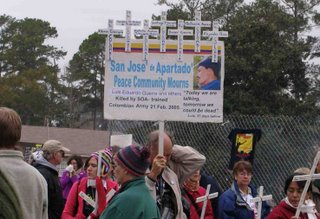¡Presente!

Last weekend in Columbus, Georgia, tens of thousands of protestors gathered outside of the gates of Ft. Benning to protest the continued U.S. involvement in contemporary Latin American political violence. Housed at Ft. Benning, the Western Hemisphere Institution for Security Cooperation (WHINSEC; formerly the SOA – School of the Americas) offers military training for soldiers and commanders from armies throughout Central and South America. Lamentably (and outrageously), many of these soldiers trained at the SOA have been linked to massacres, violence, state-funded terrorism, and human rights abuses (visit the School of the Americas Watch for news and more information). Of all Latin American countries, Colombia currently sends the most delegates to the school.
For three years in a row, I drove the 15 hours between Indiana and Southern Georgia to join the masses of protestors at Ft. Benning participating in the weekend-long sessions of workshops, protest, and, most significantly, the symbolic funeral procession during which the hundreds of names of citizens assassinated by SOA graduates are read aloud. The weekend is always meaningful, bringing together nuns and students and activists and Latin American guests to give voice to our brothers and sisters who have been victims of the United States’ hemispheric control.

Earlier this year, knowing I was going to be in Colombia during the SOA protest, I was slightly bummed to miss out on the power of the weekend. It was fortuitous, therefore, and rather poetic, that I was invited by the Barranquilla community to travel 15 hours by bus to the town of Apartadó in the Urabá region of Colombia last weekend. Apartadó is a city surrounded by some of the richest land in the country and serves as a strategic site for the distribution of Urabá’s bananas, livestock, hardwood, and other resources.
Less than twenty kilometers from Apartadó, over the mountains, lies the Peace Community of San José de Apartadó, perhaps the most well-known Colombian city within the world of international peace activism. Members of the Peace Community have committed themselves to a creative response to the ongoing armed conflict in Colombia by declaring their land a neutral, no-weapon, peace zone.

Residents of the San José area participate in workshops about the philosophy of the Peace Community and commit to upholding the following principles:
Each community member freely and voluntarily makes the decision to assume the position of neutrality as a form of resistance to the war, and to abide by the following norms:In a country in which the guerrilla, paramilitary, and military vie for social control through tactics of intimidation, disappearances, kidnappings, and massacres, San José de Apartadó has become a model for other communities attempting to reclaim and redefine their lands and their lives. Unfortunately, because this neutral stance threatens the powerful armed groups, the Peace Community continues to experience horrific oppression, including a massacre as recently as 2005.
* To participate in community work efforts
* To say NO to injustice and impunity
* To not participate directly nor indirectly in the war
* To not carry weapons
* To not manipulate nor give information to any of the parties in the conflict.
Moreover, we commit ourselves to the search for a peaceful and negotiated solution to the conflicts in our country.

As the names of these massacre victims were read aloud in Ft. Benning, Georgia last Sunday by protestors and mourners outside of the School of the Americas, it felt only fitting that I found myself in Apartadó, just kilometers away from the Peace Community, thinking and learning about the brave and innovative (and yet completely simple) philosophy of Peace adopted by Colombian citizens seeking to re-shape civil war and resist the cultural of violence.

3 Comments:
Thanks for this post, Rachel! I missed you in GA, but you were with me in spirit! Glad you, too, spent the weekend in the car:)
does the peace community experience less violence than other places do? some part of me thinks that a community like that has to be the only answer to violence. so the thought of a massacre there is devastating and hard for my mind to process.
The situation of violence in the Peace Community is complicated. Unfortunately, the neutral stance ticks off all of the armed actors in the country for different reasons: the Army because the President says that no community can reject the presence of the State, which has a right to occupy any square meter of the country; the Paramilitaries because the community philosophy questions the statue quo and their dominance; and the Guerrilla because the members of the community refuse to respond to their coersion and pressure.
Fortunately, San José has strong international support and the region is full of witnesses and allies. Being in the public eye keeps the folks a bit safer than they would be if they were alone.
Post a Comment
<< Home